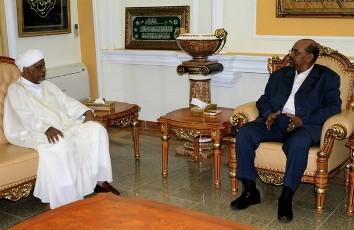Sudan’s opposition leader threatens to sack power-sharing seekers
August 25, 2011 (KHARTOUM) – The leader of Sudan’s opposition Democratic Unionist Party (DUP), Mohamed Osman Al-Mirghani, has warned members of his own party that they risk dismissal if they covete power-sharing with the country’s ruling party.

The party is expected to slash the cabinet which is made up of 32 ministers and bifurcate security apparatus. However, the NCP gave conflicting statements on whether or not the new government would feature members of opposition parties.
A dialogue between the NCP and the mainstream opposition DUP, and the National Umma Party (NUP) of former Prime Minister Al-Sadiq al-Mahdi, has been underway for months without signs of progress.
The negotiating parties are reportedly deadlocked over a wide-array of issues as the NCP continues to refuse to offer concessions demanded by opposition and asserts that it enjoys a mandate to rule on basis of last year’s elections which were marred by reports of mass fraud and opposition boycotts.
Opposition parties have called for a national government that prepares the country for new elections and resolve some key issues in consensus with other powers. The NCP however flatly rejected these conditions.
A number of well-placed sources told Sudan Tribune that Al-Mirghani, who returned to the country on Thursday after a two month absence, had been conducting intensive contacts with members of his own party.
The sources said that the veteran opposition leader had vowed to expel party members who seek participation in the government.
“I will sack whoever is tempted to participate in the government,” he was quoted as saying by the sources.
Sudan Tribune has learned that some circles within the DUP have been lobbying to bring the party to participate in the government.
According to sources close to the party, this is likely the reason why Al-Mirghani had to cut short his stay in Saudi Arabia and returned to Khartoum in order to quell internal disorder in his party.
However, other opposition groups, most notably the Popular Congress Party of the Islamist leader Hassan Al-Turabi, remain committed to regime-changing agendas, at least publicly, and accuse the NCP of a long list of failures, including the secession of South Sudan, rampant corruption and worsening economic conditions.
(ST)
